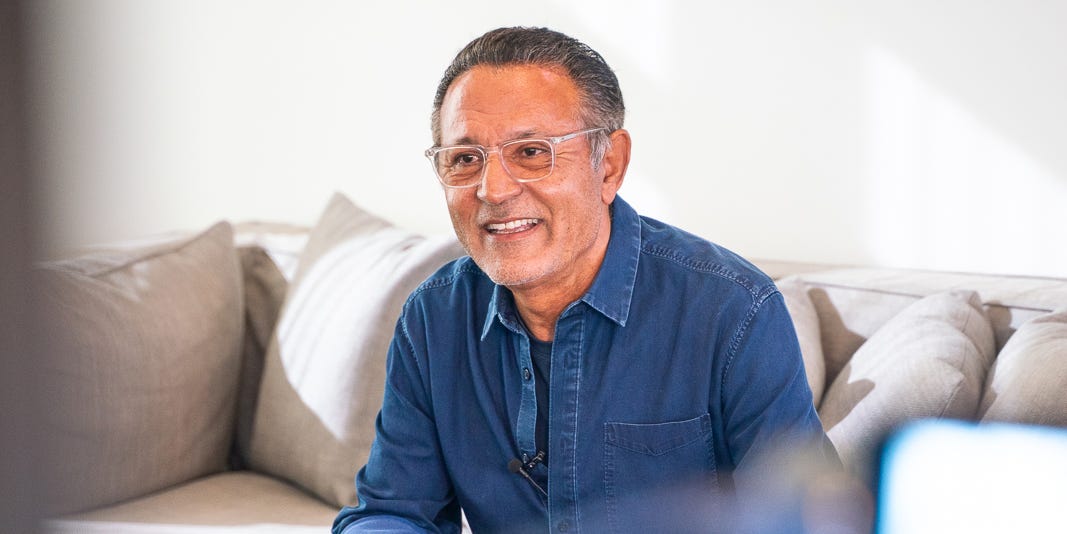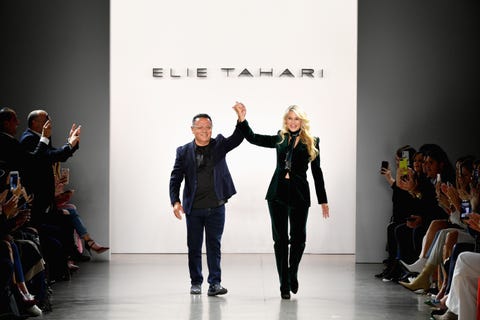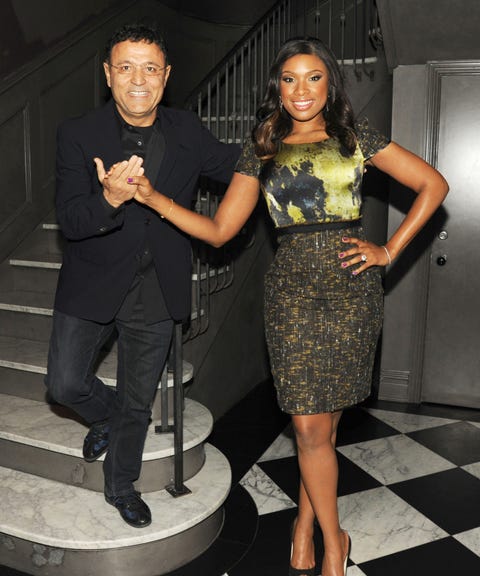Products You May Like
They say that if you can make it in there, you can make it anywhere. Nobody knows this better than Elie Tahari, who famously arrived in New York in 1971 with less than $100 in his pocket and slept on a bench in Central Park. Born in Jerusalem, the Israeli designer spent his formative years living in a refugee camp with no electricity or running water. “I remember the other kids used to make jokes out of me because my clothes were dirty and wrinkled,” he says.
If only they knew who they were dealing with. In a new documentary, The United States of Elie Tahari, now streaming on Vimeo, Tahari recounts his journey from fleeing Iran with his family to building a billion-dollar fashion empire. By all accounts, he is the living, breathing definition of the American dream—and he’s quick to profess his love for the city that allowed him to flourish. “I love everything about New York,” says Tahari, who currently resides in Midtown West. “The mentality, the fact that there are no differences, whether you’re Black or white, Jewish, Christian, Muslim… we’re all living in peace and harmony.”
As the story goes, in 1973, while working as an electrician at a clothing store in the Garment District, Tahari popularized the tube top, a then-novel design based on a bathing suit top he stumbled upon in a market on Orchard Street. The following year, he launched his namesake brand in the heyday of the disco era, with universally flattering pieces that signaled confidence, attitude, and style from the wearer, across generations—and the rest is history.
Here, more from Tahari about his upbringing, hazy memories of hazier nights at Studio 54, and the triumphant return of the tube top.
How did you decide that now is the time for a documentary?
The truth is that I always go with the flow. When the opportunity arose, I said “yes”—I didn’t say “no.” When [director and producer] David Serero heard my story, he got very close to me and said, “I make movies.” He had no backing or financing or anything; he did the whole thing himself. He filmed, he directed, he put the music to it. He’s multitalented, and I’m very proud of it.
If you ever encountered those kids from the refugee camp who made fun of your “dirty and wrinkled” clothes, what would you say to them?
I would say, “The more wrinkled clothes you have, the more opportunities you have, and it’s gonna get better and better from there.” The fact that you have wrinkled clothes only builds you bigger muscles. I was born in Israel, you know, and things are tough there. People grow strong. Kids are much more advanced—at 18 they’re already in the military. It’s proof that the more pressure on you, the stronger you get.
I was surprised to learn that you had a bar mitzvah at age 42. Why so late?
Well, I grew up going to different boarding schools. When I was 12, I was a bad boy, and at one school, I broke into the laundry room and picked out clothes for all my friends. They asked me to leave, so I went to another boarding school. They had already had the bar mitzvahs [there], so they forgot about mine, and I never had one. Then one day, I got up very early to pray [at the synagogue], and the rabbi asked me if I had a bar mitzvah, and I said “no.” He said to me, “This Saturday, you are being bar mitzvahed.” And that’s what happened. No party.
No party? Even for a regular at Studio 54?
I can only tell you the business part of Studio 54 [laughs]. The first couple of months it was open, we had a fashion show there and launched—at the time it was called “Tahari.” I remember Iman was in one of our fashion shows. Linda [Evangelista] too. And Cindy Crawford. If there were [other] stories, I wouldn’t remember them [laughs].
Is it true you were a champion roller skater?
I used to go to every hot club when I was in my twenties, and I went to one club in Brooklyn—I forgot the name—and there was roller skating there, and the music was hot. I started dancing and this guy came over; he loved my spirit, he was dancing with me, but he was on skates. Then he helped me get on my skates, and he took me around the rink until I was a free bird and I started roller skating myself. I eventually stopped because I tore a ligament. I’m doing a lot of yoga now.
What are your thoughts on the reemergence of the tube top trend?
When I first discovered the tube top in the ‘70s, women used to let it all hang out. It was fashionable not to wear bras. The elastic held it all in like a bra.
I’d argue that a lot of women gave up bras during lockdown.
I think it’s better to wear a bra! [Laughs.] You can wear a strapless one, I guess. I look at the tube top as fast fashion; I don’t look at it as fashion. It’s something that women wear as a throwout piece.
How would you describe the New York woman?
A lot of them dress like they are going to the gym. But the most beautiful women are in New York—that’s known around the world. From every ethnicity.
Looking back, what would you say was the biggest challenge you faced in your career?
When we had to close the company 30 years ago. Ten years after we started, we lost everything because I was a poor operator. We started a whole new corporation, Tahari Ltd., and went back to business. That just grew and grew and grew.
How has your Sephardic background shaped who you are today?
My father used to have a fabric store in Tehran, and because he had a mezuzah on the door, someone lit the store on fire and he lost everything. So we came back to Israel. My mother also had epilepsy, and she couldn’t take care of us—there was no medication at the time for it. When she was 40, she had joy and nahas, which means “satisfaction from your children.” In Persia, you should see blessings at the end of your life—it doesn’t matter where you start, how you start, or what you’ve been through. I always try to teach my children humility, appreciation, and [to] always be giving. It’s a good example from my past.
This interview has been lightly edited and condensed for clarity.
This content is created and maintained by a third party, and imported onto this page to help users provide their email addresses. You may be able to find more information about this and similar content at piano.io


